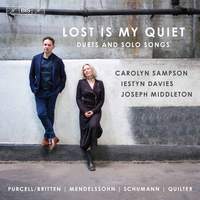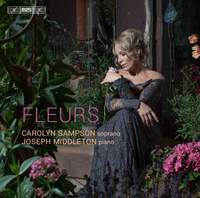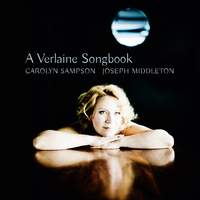Interview,
Lost is my Quiet

Operatic duet recitals are something of a regular fixture on record and in the concert-hall, but programmes of songs for two singers and piano are decidedly less thick on the ground – even sets like Mahler’s Des Knaben Wunderhorn and Wolf’s Spanisches Liederbuch which are often shared by two singers tend to deploy the individual voices in dialogue rather than duet. Soprano Carolyn Sampson and countertenor Iestyn Davies joined forces last year with Carolyn’s regular recital-partner Joseph Middleton for a lunchtime Prom exploring the wealth of duet repertoire that rarely gets an outing, a performance described by The Independent as ‘chamber music of the highest quality’.
I met up with Carolyn, Joe and Iestyn on the afternoon of the Gramophone Awards last month (where Iestyn won the Baroque Vocal category for his recording of Bach Cantatas with Arcangelo on Hyperion, and Carolyn collected the Choral Award for the Mozart Mass in C minor and Exsultate, jubilate with Masaaki Suzuki and the Bach Collegium Japan on BIS) to find out more about the project.
Given that the four composers who feature on this album are so well known, it strikes me as rather surprising that this particular area of their output isn't performed or recorded more frequently...
JM: I think it’s partly to do with the logistics of doing a song-recital or recording with more than one singer, who are then having to split a fee; you have to find singers that actually want to work with each other like this, and have the availability to do so. A lot of this stuff was really written to be done at home, among friends (Schumann often would’ve played his own piano parts, as would Britten) – it’s a more homely, home-spun type of music-making. But to put that sort of thing on a professional stage (or take it into the studio), there’s a lot of things that have to fall into the right place for it to work.
ID: Indeed. Even if it has been recorded before, it’s usually a library recording (part of a complete Mendelssohn songs or similar), which isn’t necessarily the sort of thing that you’d want to sit down and listen to in one go (though I’m sure some people do!). So our idea was simply to say ‘These are some great things you may not have heard before which hang together really well!’.
The few existing recordings are mostly done by soprano and baritone – did you have to do much in the way of arranging and transposition to make them work?
ID: No, I just sing them up the octave! And actually some of the Schumann and Mendelssohn are originally for soprano and alto, though the Quilter is definitely transposed – it’s quite operatic!
CS: We didn’t have to tweak too much, but we figured it’s kind of legitimate anyway, because they were all written for whoever was there at the time – and in this case we were there at the time!
When did you start working on the programme?
ID: Maybe two years ago, about a year before we did our lunchtime Prom of the programme – I feel like we’re living in a time-warp at the moment, as exactly this time last year I’d just got back from holiday and we sang this programme at Cadogan Hall, and here we are today with me just back from the same place, sitting a stone’s throw from the venue discussing the recording!
CS: This is the third disc that Joseph and I have done together, and one thing often leads to another – we’ll be recording one thing and then the ideas start coming, often as we’re chatting on the way home from sessions and discussing what we’ve particularly enjoyed. The gestation period’s generally about a year.
ID: I just wait for the phone-call! I wasn’t performing with them at the time, but it was a lovely way to put down on disc music that isn’t often done, and also to sing repertoire that people might not immediately associate with Carolyn and I.
CS: Yes, as far as a lot of people are concerned, ‘our’ duets should be Handel! But we’ve done surprisingly little of that kind of thing together. We have talked about doing something along those lines, but it’s quite over-recorded and as Iestyn says it’s nice to do something that people wouldn’t necessarily expect from us.
ID: In fact Carolyn did sing on the Handel arias disc which I did with Robert King a few years ago, but it’s kind of difficult to do a full Handel duets disc with her because she’s done it all already with Robin Blaze!
Some of the ornamentation in the Purcell/Britten is gloriously extravagant! Did you devise this yourselves?
CS: Oh, we had a lot of fun with that!
ID: This music is already a relic that’s been varnished by Britten. It’s got some very garish cadences at the end of each verse, which suddenly make it sound far less seventeenth-century; Britten actually wrote in the front of the score that he wanted singers to extemporise if they felt the urge. And at the time it was music that people didn’t really know how to interpret, so he was saying ‘Don’t feel like this is a sacred cow’; of course now it sounds very much of Britten’s time, and playing Purcell itself has advanced in terms of authenticity. But both are equally valid, and I quite like having the ornaments in there because you think ‘When do we let go of this 'authenticity' thing and just say we’re now doing Britten’?!’
Iestyn, do you think there's stilll a certain amount of resistance to the idea of countertenors singing Lieder?
ID: It sounds like a huge question, but in the grand scheme of things the whole world of classical music is so niche that if you hear one person saying ‘I don’t like countertenors singing lieder’, it gets blown up out of all proportion. Quite a few people have done it, and it’s certainly not that people don’t want to hear it - but it’s not that easy to go around doing recitals (you generally have to be invited to do them, unless you’re going to put something on yourself), and when I’ve been in situations where I’ve suggested programming lieder people have raised eyebrows. Actually once at the Wigmore Hall, John Gilhooly said as a sort of joke ‘We don’t want you singing Winterreise!’. But actually I did go on to sing Die schöne Müllerin, and John came to me afterwards and said ‘I’ve changed my mind, it’s great!’ - that particular song-cycle fits, it just works.
The problem is that there have been a few misguided recordings, and unfortunately that can stick and people say ‘Oh, have you heard that awful recording of a countertenor singing Liederkreis?’ It’s difficult to escape that.’
JM: Though that’s true of every voice-type to some extent…
ID: Yes, but with other voices you’ve got lots and lots of recordings to choose from! People still tend to put all countertenors in one bracket, as if we’re all basically the same singer – that's where the real problem lies, whereas the reality is that it’s become more and more varied. But what it shouldn’t become is that if you sound more like a woman then somehow that entitles you to do lieder!
Actually I’ve always gone along the path of putting recitals together around a particular theme, which is particularly effective if you’re avoiding being typecast as a baroque singer: if I’m programming a concert for the Wigmore Hall or similar, then I’ll go down the road of choosing things that the pianist is happy playing rather than reductions of Handel arias. And that’s always ended up with me coming up with a title or theme…
JM: We did a nice programme on the theme of ‘History repeating itself’, exploring works which quote other works…
ID: I did one recital where I sang Mahler’s 'Um Mitternacht' straight after Dowland’s 'In darkness let me dwell', in a programme exploring the idea of night; when the Dowland finished and the first note of the Mahler emerged, I think a lot of the audience didn’t even twig that there was anything odd about hearing a countertenor make that leap. To be honest, most people are there to enjoy a concert and aren’t necessarily that well versed in what you ‘should’ or ‘shouldn’t’ sing. I did an encore the other day after a recital with a lutenist who was once described by BBC Music Magazine as ‘the Eric Clapton of the Lute’, so we always play 'Tears in Heaven'! But I couldn’t put it in the actual programme, because it was a very serious recital, so instead I just announced it as "a recently rediscovered piece called ‘Lacrime in cielo’" and we did it as an encore! And someone came up to me afterwards and asked me who wrote it! A song is a song, and if it’s a good one then it should work. It’s like covers of pop songs, really: if the material itself is good, then they work in any style (provided they’re done well, that is).
How different is the dynamic between you in this sort of programme as opposed to a conventional song-recital?
CS: Very! The main thing about this disc is that we want people to enjoy (and to hear us enjoying) the whole chamber-music feel of it. And I think when people came to the Prom, which was basically a shortened version of the disc (we cut the Schumann and a few of the Mendelssohn), they really noticed that we were having fun with this music and that it had quite a relaxed feel. The thing about having two singers in a recital is that it’s automatically a bit more relaxed, because each of you have a pressure taken off a bit once there are three people onstage rather two. Even the concentration is different, because if it’s just you, your focus is very much on the audience and you in that story, and once there are two of you involving in telling that story the energy somehow changes.
JM: It’s an extra set of ears that you have to have, and for me too it's a completely different experience to doing a standard song-recital where there are just two of you: when I'm keeping track of two vocal lines I have to be on the alert in case somebody takes a bit of time, somebody breathes in a different place...You’re having to constantly adjust in a different way than when you’re working with just one singer.
CS: And of course Iestyn and I are also doing that for each other, so it’s very much a three-way process.
ID: I think that part of the reason why it works for us is that we all had a very similar musical training in that we all went through choirs and sang in groups, so we’ve all grown up doing a lot of music-making with others. It’s collaborative, generous music-making, looking out of yourself all the time.
Lost Is My Quiet was released on BIS on 15th September; The Guardian described it as 'beautifully judged, the two voices playing off each other and sharing nuanced expression'.
Available Formats: SACD, MP3, FLAC, Hi-Res FLAC
"Always a lovely Baroque singer, Sampson...is hardly less persuasive in Romantic songs...Middleton creates limpid, luminous textures...an imaginatively planned, beautifully executed recital that charms and touches by turns." (Gramophone)
Available Formats: SACD, MP3, FLAC
"Sampson adores these songs, caressing the text with her beautiful, pure soprano, particularly those that dwell on the correlation between nature and the emotions. Her partnership with Middleton is inspired, his intelligence always evident." (The Guardian)
Available Formats: SACD, MP3, FLAC, Hi-Res FLAC





